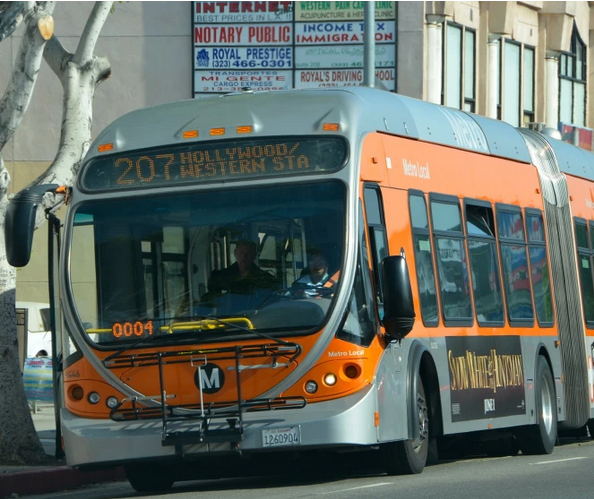Metro boardmember Mike Bonin called it a "horrible choice." Faced with an operator shortage and COVID Omicron spike, Metro staff have recommended temporarily cutting bus and rail transit service by 10-12 percent.
Metro Chief Operations Officer Conan Cheung outlined the proposed cuts in a presentation [slide show] at this morning's meeting of the Metro Operations Committee. The proposal is expected to be discussed further at next week's meeting of the full Metro board, though it is not yet clear what the approval process would be.
As directed by the board a year ago, Metro has been struggling to restore transit service cut at the beginning of the pandemic. As of last October, Metro had, on paper, restored transit service to pre-COVID levels, but, on the ground, riders were experiencing ten percent cancellations of scheduled bus runs.
Metro blames an operator shortage for its inability to run the funded board-approved transit service. Since early 2021, Metro has been pushing hiring more drivers, but operator attrition continues to outpace hiring.
Metro is leaning heavily on the operators it does have. Since early 2021, the agency has increased the use of "ordered call backs" (OCB - more or less mandatory overtime assignments) to staff many canceled runs. According to Cheung, burnout is high and morale is low among Metro operators as average work weeks rose from 43 to 48 hours.
And then omicron arrived.
From the data we've been able to find: Metro canceled about 15% of its total service hours (~14% of trips). But! This is not at all evenly distributed in time and across routes. Some routes saw many more cancellations, and it can be particularly acute during peak hours.
— Investing in Place (@InvestinPlace) January 20, 2022
Over the past month or two, canceled runs increased. Operators were out sick, including caring for family members. Already-unreliable bus service became even more unreliable.
Now the board faces a choose your poison dilemma: bus service cancellations (unreliable spontaneous cuts) vs. officially reducing bus service (somewhat reliable planned cuts.)
Metro Operations staff are proposing temporary service cuts, lasting approximately three months starting February 20. There are no details available other than the above slide. It looks like bus service would be cut 10-12 percent. Rail cuts are less clear - expressed only in bleak peak hour headways - perhaps to prevent the board and public from comparing bus to rail?
Even if the board chooses to slash service, Metro is still predicting a 5 percent weekday cancellation rate. Before COVID cancellations ran at about 1-2 percent.
There are few worthwhile off-menu choices mentioned during this morning's discussion:
- Use equity to target cuts. Boardmember Holly Mitchell urged Metro to, instead of across-the-board cuts, take equity into account. Under COVID, many bus lines that primarily serve low-income communities of color saw relatively high ridership; ridership declined less and rebounded more quickly. Metro CEO Stephanie Wiggins commented that she agreed with this approach, but Cheung made it sound logistically difficult.
- Pay drivers better. Metro staff say they are doing a lot to recruit bus operators - ads, bonuses, rewards, job fairs, etc. - but the positions remain difficult to fill because the work is basically high stress and low pay. By depending on a great deal of overtime, Metro is already effectively ending up paying higher wages. Why not just make it official? Bonin stated that he supported Metro paying operators "well above minimum wage."
- Pause collecting fares, to reduce dwell time and benefit riders. Metro resumed bus fare collection ten days ago. The date had been planned months in advance, so it was difficult to know that the change would fall during an unprecedented spike in L.A. County COVID cases. The resumption was a slap in the face to riders, who are paying more for service that could be counted on less and less. With folks lining up at one door to pay, bus dwell times worsened by ten percent - adding an average of 40 seconds to a typical bus customer ride. (Metro terms this "No substantive impact" - see slide 8.) This morning, Bonin questioned fare collection impacts on dwell times, asking for additional detail in a report back. If Metro is looking at temporary service cuts, it could also look at a temporary pause on fares. This would help improve bus speed and reliability, advance equity, and eliminate a sometimes stressful (and possibly COVID-ful) interaction between operators and riders.
Tune in to next Thursday's board meeting for further discussion of this rapidly changing story.






